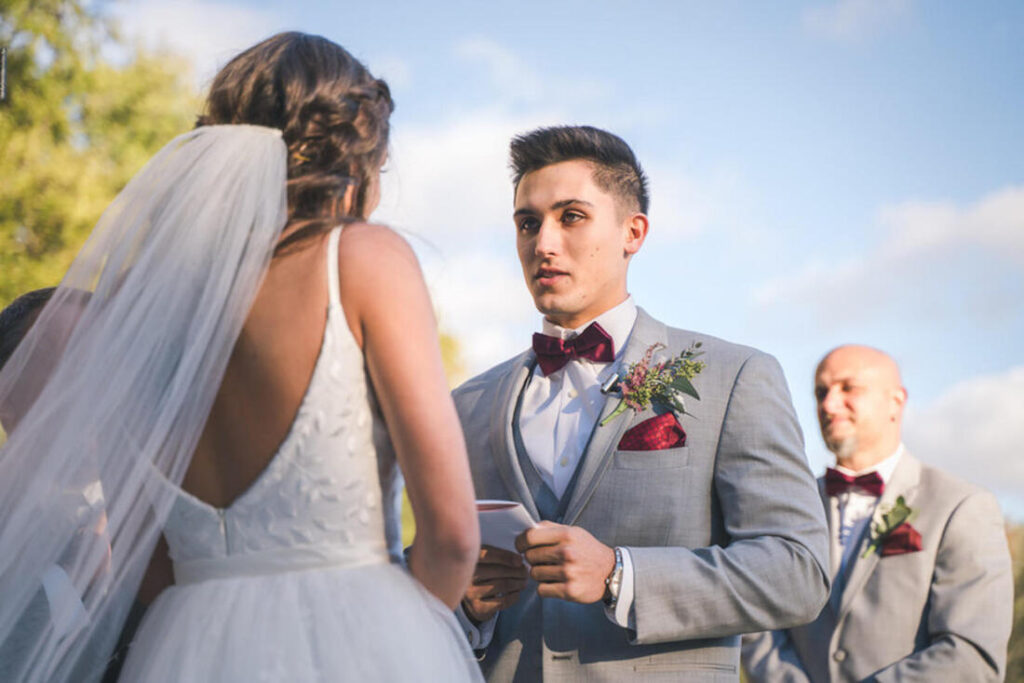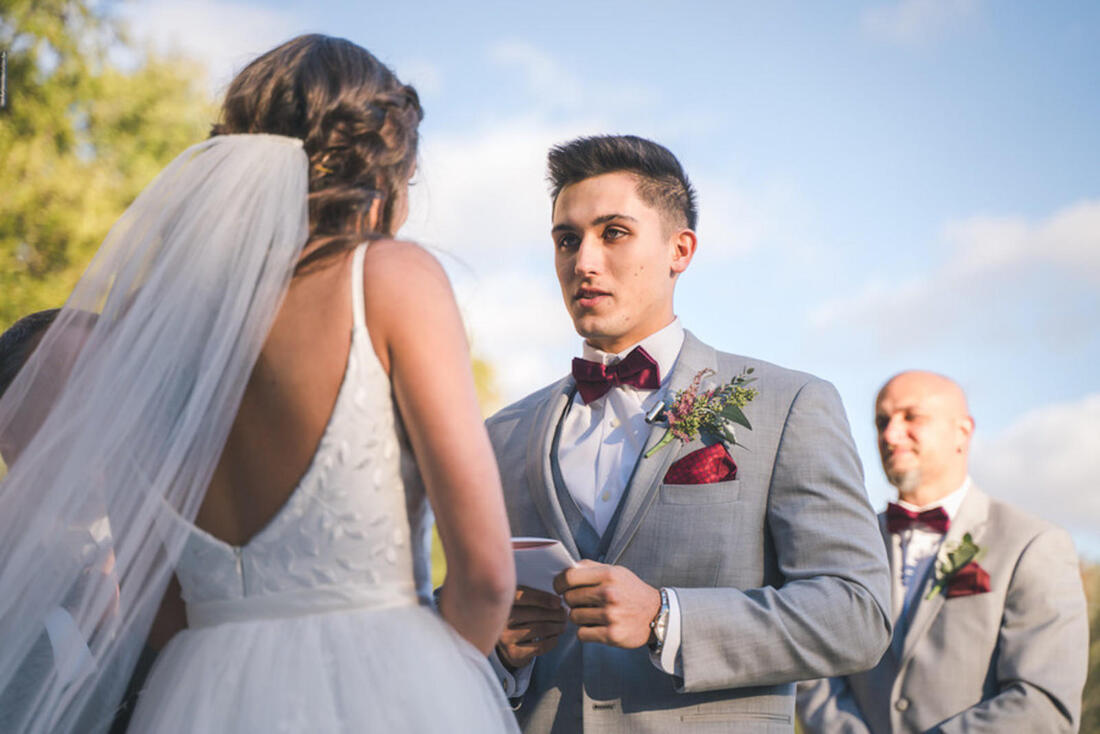
Here is a nice article on Zola.com about writing your own vows:
Writing your own wedding vows is one of the most personal ways to add a romantic and intimate touch to your wedding day. While traditional wedding vows have stood the test of time and represent the beliefs and sentiments of different religions and cultures, they might not be right for every couple, especially if they don’t speak to your heart. Vows that you pen yourself are specific to your relationship—whether you share precious memories or illustrate just what defines your love—in a way that adds an extra layer of meaning to your wedding ceremony. However, as you may have already learned, writing your own wedding vows isn’t as easy as you’d expect. These tips on how to write wedding vows will help guide you through the process from start to finish.
Writing Your Own Wedding Vows: How to Start?
Knowing where to start when writing your vows might be the toughest part: when staring at a blank sheet of paper, just getting a few words down can feel like a huge hurdle. You might be putting a lot of pressure on yourself to write the perfect set of sentences, considering your vows are a reflection of your marriage and the promises you intend to keep for the rest of your days.
If you’re stuck getting started, try these suggestions to get your creative and romantic ideas flowing:
- Free write: Without worrying about what you’re saying or how you’re saying it, start putting thoughts down on paper and let your mind wander. Free write and see where you wind up after a few minutes. Maybe you’ll uncover a great memory or a kernel of truth that you hadn’t previously thought about—or maybe you’ll just clear out your mental pathways a bit to make way for the “good” stuff. Either way, you’ll have conquered that blank page.
- Think back in time: By going down memory lane a bit, it will be easier to remember how and why you two fell in love, and what journeys you’ve already taken to bring you to this point in time. How did you two meet? What did you do on your first date? When did you first know you were in love, or say “I love you?” Any of these moments are a great starting point for your vows.
- Make a list: Organizing your thoughts into a list is a classic way to jumpstart your thinking and reveal feelings you didn’t even know you had. Write a list of all the things you love about your spouse-to-be: their best qualities, their most charming quirks, the reasons why you are compatible. Hopefully this will trigger a theme or reveal a memory, story, or pattern you can use to begin your vows.
- Relieve the pressure: If you’re too nervous about getting your vows 100% right to actually write them, tell yourself that they don’t have to be perfect. They just have to be sincere, heartfelt, and personal. A few simple lines telling your partner how much you love them and your promises for the future are all you need, so don’t demand Shakespearean love sonnets from yourself.
Steps for How to Write Your Own Wedding Vows
1. Start Writing Early
Do yourself a favor and give yourself plenty of time—this is a point that we cannot stress enough. Perhaps you have months until your wedding day, but this a task that you want to save for the last minute. By starting early, you’ll give yourself plenty of time to overcome any nervousness or writer’s block, make revisions to your first draft, and practice reading vows aloud before your big day.
2. Establish Your Tone
Before you really get started writing, establish what sort of tone you want your wedding vows to have. Your vows should reflect your personality, whether that’s quirky and romantic or more tear-prone and sentimental. Or maybe you’d rather keep your vows light and humorous. It doesn’t matter what style you choose, just make sure the tone you choose for your vows makes you happy and excited to share your words with your spouse-to-be on your big day.
On that note, it’s also a really good idea to decide on the tone of your wedding vows as a couple. You might not be thrilled if you bare your soul with heavy, heartfelt words while your partner goes a completely different direction with a hilarious or semi-embarrassing story. Make sure you and your fiancé(e) are on the same page here.
3. Seek Out Inspiration
Love is one of those confounding topics that humans grapple with constantly. How can we describe how love feels? How can we capture it through words? What does it mean to be in love? Thankfully, over the past few centuries many famous poets, writers, playwrights, and screenwriters have come very, very close to getting at the heart of those questions through beautiful, relatable, and transcendent works of art. Don’t let these resources go to waste when you’re battling writer’s block or struggling to put your feelings down on paper. If there was ever a time to return to your favorite pieces of literature or beloved films, it’s now. Once you find something that speaks to you, feel free to try to mimic that sentiment in your own words or quote it verbatim in your wedding vows.
4. Talk to Your Partner
One of the best ways to figure out a direction for your vows is to sit down and have a heartfelt talk with your fiancé(e) about your relationship, your feelings for each other, and your marriage goals. Discuss what you want your ceremony to feel like and how you’d like your relationship to be portrayed in front of friends and family. Talk about what makes your relationship yours. You might remind each other of special or defining moments in your relationship, or even come up with the very words you’ve been struggling to find. This conversation will not only help guide the focus of your wedding vows, but also verbalize your promises to each other.
5. Reflect Alone
After your talk with your fiancé(e), find time to be alone and reflect on that conversation. Tackle the big questions, such as how he/she makes you feel, what inspires you about him/her, and how he/she has made a positive impact on your life. This is no easy task (hence why we recommend starting this process early), but once articulated, your responses will give you lots of material for your vows. A little bit of quiet meditation might just reveal the language you’ve been carrying deep in your heart.
6. Take Trips Down Memory Lane
Another great way to personalize your wedding vows is to highlight specific details of your relationship. Think back on special moments with your spouse-to-be, beyond some of the obvious ones like when you first met or your first kiss. What was the first trip you took together? When did you first make each other laugh so hard you cried? Think of your private jokes, hilarious stories, and even embarrassing moments. Whether or not you choose to mention these memories in your vows, remembering them will absolutely help you define what makes your relationship—and, thus, your vows—unique.
7. Don’t Worry About What Others Think
When you start writing your own vows, it’s easy to wonder (and worry) what others will think about what you have to say. “Will guests think our inside jokes are dumb?” “Will they get bored if we go on too long?” “Will Grandma and Grandpa judge us for foregoing traditional vows?” We know it’s hard to not take your guests into account after addressing and sending all those save the dates, but your ceremony is no one’s but yours and your partner’s. Let your vows reflect who you are together and what you want to celebrate about your relationship.
8. Create an Outline
Without a bit of organization, your wedding vows can easily turn into stream-of-consciousness rambling. Stay on track by crafting a brief outline that will organize your thoughts chronologically or thematically and ensure your vows have a clear beginning and end. Something as simple as the following will do just fine:
- Intro: Funny anecdote
- Your thoughts/feelings when you first met your partner
- Your thoughts/feelings when you knew you wanted to spend the rest of your life with him/her
- What those feelings mean to you today
- Where you see your relationship going after your wedding day
9. Keep It Short and Sweet
When it comes to wedding vows, often less is more. Don’t feel pressured to write lengthy vows when a few short, from-the-heart thoughts can be just as moving. After you’ve finished writing, it’s a great idea to practice speaking your vows aloud while timing yourself. If you go over two minutes, try cutting them back. We know 120 seconds doesn’t seem like much time, but when it comes to speaking in public, that minute will last a whole lot longer than you expect. Plus, there is no need to try to impress the crowd by showing off your prose skills—your vows are a message to your partner, after all.
10. Embrace Free Association
Unless you’re a walking thesaurus, it can be hard to find the exact right words to express yourself. A great vow-writing exercise that will keep you from looking up words every 30 seconds is to write with free association. This means writing down the first few words that pop into your mind when you think of your fiancé(e), your relationship, your feelings for each other, etc. and leaving the narrative editing for later. This practice will help you make natural word choices without fear of misunderstanding.
11. Include Sincere and Meaningful Promises
Wedding vows are, in essence, a list of promises that you make to your partner. Whether it’s loving him/her always or guaranteeing that you’ll do the dishes every Monday and Wednesday night, your vows should incorporate the promises you swear to uphold, and demonstrate the sacrifices you are willing to make as an equal half of your union.
12. Think to The Future
In addition to making promises, make sure that your vows also include a look to the future of your relationship. Where will you go from “I do?” What do you expect or want your marriage to look like a year from now? Fifteen? Fifty? What will you do to keep your bond strong over the years? Even if the phrase “’til death to us part” doesn’t make the cut, don’t forget to anticipate the joys and challenges of marriage ahead. These important details will both guide the promises we mentioned above and give weight to your wedding vows.
13. Speak from Your Heart
Above all, your wedding vows are about expressing your true feelings about, and to, the person you’re about to spend the rest of your life with. When it comes right down to it, nothing is more important than saying what you truly feel in a style, length, and tone that defines your and your partner’s relationship.
